Civil War Texas Governors
Sam Houston
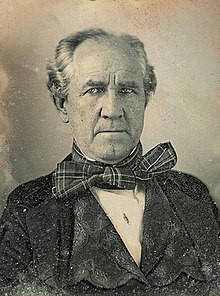
Sam Houston
Samuel Houston (1793-1863)
Governor of Texas from December 21, 1859 to March 16, 1861.
Sam Houston was an American soldier and politician. His victory at the Battle of San Jacinto secured the independence of Texas from Mexico in one of the shortest decisive battles in modern history. He was the first President of Texas (1841-1844). As Governor, he opposed Texas secession and refused an oath of allegiance to the Confederacy when Texas seceded from the Union in 1861 with the outbreak of the Civil War, a decision that led to his removal from office by the Texas secession convention. He retired to Huntsville, Texas where he died before the end of the war.
Edward Clark

Edward Clark
Edward Clark (1815-1881)
Governor of Texas from March 16, 1861 to November 7, 1861
As a lawyer, Edward Clark served two terms as a state representative in the Texas Legislature before fighting in the Mexican-American War. When the war ended, he served as secretary of state, then lieutenant governor under Governor Sam Houston. When Sam Houston refused to take an oath of allegiance to the Confederacy, Clark became Governor. He lost the governor’s race by 124 votes to Francis Lubbock and joined the 14th Texas Infantry. At the end of the Civil War, he fled briefly to Mexico, he returned to Marshall, Texas.
Francis R. Lubbock
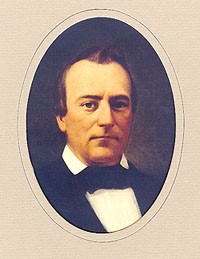
Francis R. Lubbock
Francis R. Lubbock (1815-1905)
Governor of Texas from November 7, 1861 to November 5, 1863
Francis Lubbock was elected lieutenant governor in 1857, but failed in his reelection bid in 1859.
Following the Confederate secession in 1861, he won the governorship of Texas. He supported Confederate conscription – working to draft all able-bodied men, including aliens, into the Confederate State Army. At the end of his term, he became aide-de-camp for Jefferson Davis. After fleeing from Richmond, Virginia, he was caught and imprisoned at Fort Delaware for eight months before being paroled. After returning to Texas, he served as Texas State Treasurer.
Andrew Jackson Hamilton
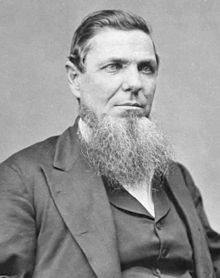
Andrew Jackson Hamilton
Andrew Jackson Hamilton (1815-1875)
Military Governor of Texas
As a lawyer, Hamilton was a member of the Texas House of Representatives (1850-1853), U.S. House of Representative (1859-1861) and Attorney General of Texas (1850).
During the American Civil War, Hamilton sided with the Union. After fleeing to Mexico, he went on a tour of the Northeast, giving speeches in New York, Boston, and other northern cities. He spoke out in favor of the Union and criticized the “slave power” of the South. He was regarded as a hero by the North, and a traitor at home.President Lincoln named Hamilton the Military Governor of Texas with the rank of brigadier general of volunteers. He spent the rest of the war holding this empty position in New Orleans, after a Union attempt to capture South Texas failed in 1863.
Pendleton Murray
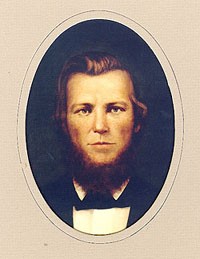
Pendleton Murray
Pendleton Murray (1824-1865)
Governor of Texas from November 5, 1863 to June 17, 1865
After being raised and educated in a Baptist orphanage, he became a lawyer and moved to Texas. He was a member of the House of Representatives in 1857, but declined to run for Congress because of ill health – probably tuberculosis. After his health recovered sufficiently, he joined the 14th Texas Infantry. After winning the gubernatorial election, he supported the Confederate cause. After Robert E. Lee surrendered in 1865, he encouraged Texans to continue the revolution. When he learned that the Union army forces were in route to Texas, Murrah fled to Mexico before his term ended. He died in Monterrey on August 4, 1865.
Andrew Jackson Hamilton

Andrew Jackson Hamilton
Andrew Jackson Hamilton (1815-1875)
Governor of Texas from June 17, 1865 to August 9, 1865
President Andrew Johnson named Hamilton as the provisional civilian governor of the state. He held the office during the early stages of Reconstruction and granted economic freedom to the newly freed slaves, although Texas itself declined to ratify the amendment until 1870. Hamilton also faced problems such as Indians, general lawlessness, and chaotic finances in the aftermath of the Civil War.
C.C. Campbell Letter
This transcription was copied from the original document and is representative of all spelling, punctuation, and grammar as written by the creator. The original document is housed in the Pearce Civil War Collection, Pearce Collections Museum, Navarro College, Corsicana, Texas. https://www.PearceMuseum.com
July 23/ 65L
A Peaby
Dear Brother
It has been a long time since I have heard from you or aney of my folks
Now this cruel & bloody war is over I hope to hear from my folks soon, it will soon be five year since I have heard from my folks I hope they are all alive & well my business is such that I cannot well leave at present, But if my Father & Mother are alive I will come home soon as possible I would like very much to see them once more. Pleas write me on receipt of this (Direct your letter in care Provo Marshall Houston Texas)I went to hear J. Hammilten our Miletary Governor make a Speach last evening he gave the rebels some plain talk, the Seces drove him out of the State about two years ago he told them all about it Mr Peaby I have stayed here through the war to protect my property & I expect now to loose it all, as to property I expect I am about where I was at 21 years of ageThere is a good chance to make some money on cotton here I know the condition of cotton in this State of La on Keed river as well as aney man in the State
The Govt will not let the cotton go out yet unless the Shiper can show a clear title & most that has gone out has been Stolen cotton, I can get permitt to take out all the cotton that I can get money to purchase & it is but a little money that I can raise
Have you got got some man that you can send out here with $10,000 or $20,000 in Specie you can Deposit in Bosten & draw on it as you make your purchesses here I can get good cotton here now for ten cents (10₵) pr pound and I can get it shiped to New York or Bosten fer three (3 cts) cents & two cents (2 cts) fer Govt tax would mak five (5) cts which would make the cotton cost fifteen (15) cts in New York or Bosten so you can tell wither there is aney money in it or not
Now if you will send a man out here I will assist him in purchaseing all the cotten you think best to purchase
Or if you have no one to send if you think advisable to go into the cotton a little I will make you a proposition If you will send me a letter of credit to Draw on you at sight in Boston I will make inves it to the best of my abilety aney amont you may se fit to send I will ship the cotton censign it to you in New York or Bosten as you may direct, fer my trouble I shall ask one half the profit after you get your money back & all the expences are paid we will devide the ballance or if you think best I will go with the cotton to New York or Bosten as you direct it , now you can see what cotton is worth & make up your mind if there is aney money in it & if you should conclude to go into it you will have to do it at once fer cotton will rise here soon as matters beceme settleed I am satisfied that all the permits I ask fer will be granted & no one can take out cotton yet without first getting a permit to do so, if you conclude to go into this you can send the Letter of credit to Some Bank or Some House that you are acquainated with in New Orleans & write me at Houston also write me (at Shreveport Louisania) that you have sent the letter of credit as I am going to Shreveport soon I shall ship some cotton from Shreveport down red river to New Orleans If you should have to take in another party to rais the money I will make it thirds If you do aney thing do it quick & write me at Houston and at Shreveport & if you should not do aney thing please write me at both places this is a safe thing you or your friends need not be afraid of it
Respt yours C.C.Campbell
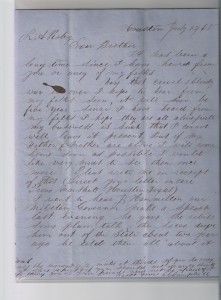
C.C. Campbell Letter, pg. 1
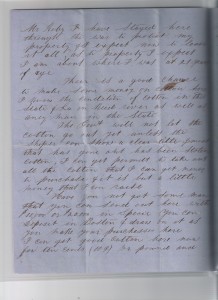
C.C. Campbell Letter, pg. 2

